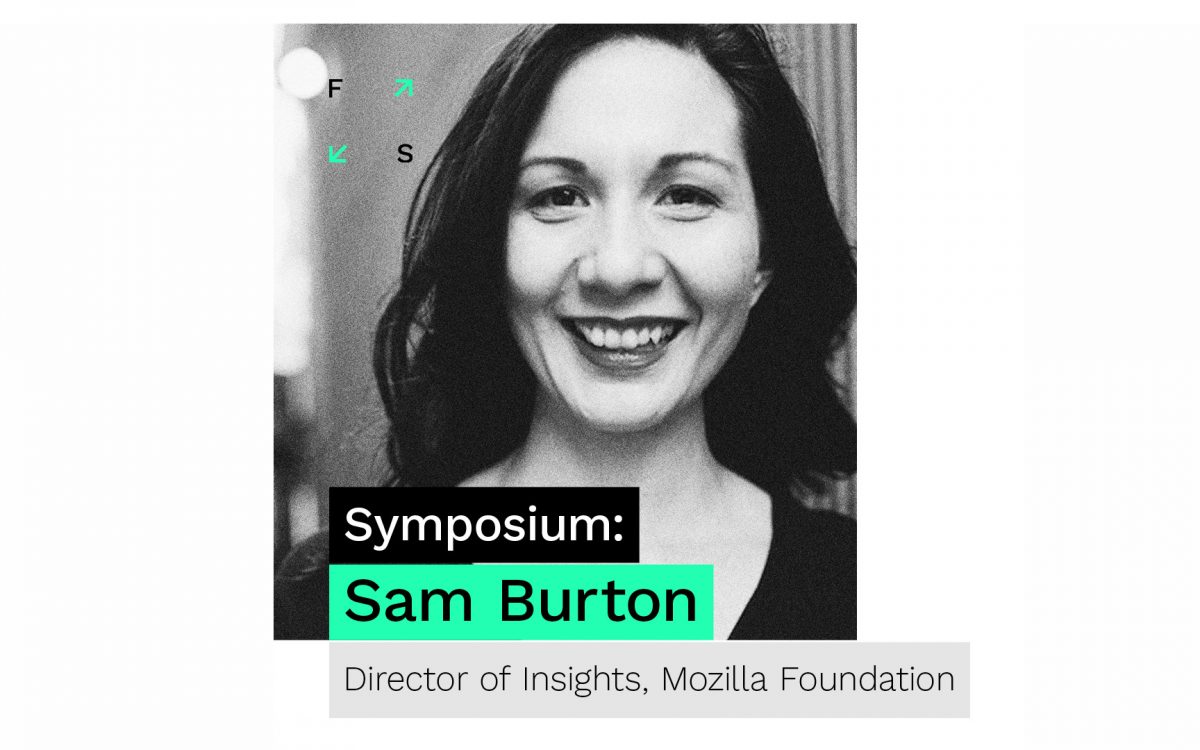Hi Sam, thanks for chatting with us today. Could you tell us a bit about you and what you do?
I’m the Director of Insights at the Mozilla Foundation, where my team publishes the Internet Health Report. My role is to help Mozilla and others make sense of the complex interactions between technology and society—and to identify ways that we can work together to increase the benefits, and mitigate the harms, of our digital world. Easy, right?
What are the questions you’re interested in raising through your practice, and why is it important we have these conversations now?
A big question on my mind these days is: what is the future we want?
Whether we’re reading the news or watching Black Mirror, the stories we’re currently telling ourselves about how technologies are (or could) impact people are overwhelmingly rooted in fear. And yes, there’s a lot to be afraid of. But if we stay in a place of fear, we can only react to things that happen—to the latest data breech, or biased algorithm, or deepfake.
I want more of us to feel empowered to do more than just react. I want more of us to imagine the future we want, and to believe we can create it. The digital world we live in now is being built by a handful of people—people who are mostly men, mostly white, and mostly in big urban centres. But this isn’t a ‘natural’ state of affairs. The future can be different, and it will be if there are more diverse people building it.
Still, I often find it difficult to imagine different futures, especially ones where technology plays an overwhelmingly positive role in our lives. This is why I think that art and conversations like these are critical. We need to help each other turn away from fear, so we can imagine what other worlds are possible—and build them, together.
What does ‘voice’ mean to you in the context of technology and digital culture?
Voice has been the primary mode of human communication and self-expression for nearly two million years, so I think it’s pretty natural that we want our digital devices to talk and listen. The question is: who will they listen to?
Developers need huge amounts of speech data to create voice systems. Today, most speech databases overrepresent certain groups, leading to a bias towards male and middle-class voices in the datasets—and therefore also in the technologies they are used to train. This data is also often expensive and propitiatory, which significantly limits who can access the building blocks needed to create voice systems.
To help address this issue, Mozilla created Common Voice: an open-source project that lets people ‘donate’ their voice to the database and enables anyone to use it for free. It’s is now the largest free and open speech database. The dataset includes 18 different languages, and 1,400 hours of voice clips from over 42,000 people. Part of the project’s aim is also to gather recordings from non-native speakers with different accents, so that voice recognition services work equally well for everyone.
There’s still a lot to do, but I think that Common Voice is a significant step forward. I’m proud to be part of an organisation that’s committed to being part of the solution.
The future is increasingly driven by algorithms… should we be concerned?
Algorithms, like any technology, aren’t inherently good or bad. But they’re not neutral either. The ways they are designed and deployed will determine if (and for whom) they’ll cause more benefit or harm. We need to be very paying close attention to what problems we’re trying to use algorithms to solve, who is designing those solutions, and what data they’re using to inform that design.
In the world of tech and digital culture right now, what do you see as the most exciting opportunities and the biggest challenges or concerns?
I’m concerned about the huge amount of power and influence that is currently concentrated in the hands of nine big tech companies: Google, Microsoft, Apple, Facebook, IBM, Amazon from the US and Tencent, Baidu, and Alibaba from China. They’re continuing to “move fast and break things” while governments and citizens are racing to catch up.
That said, it’s definitely energising to see more people starting to recognise and examine the influence that digital technology has on society. This year, I’ve heard my local morning radio show cover deepfakes and had conversations with my dad about biased algorithms. That never would have happened two years ago.



